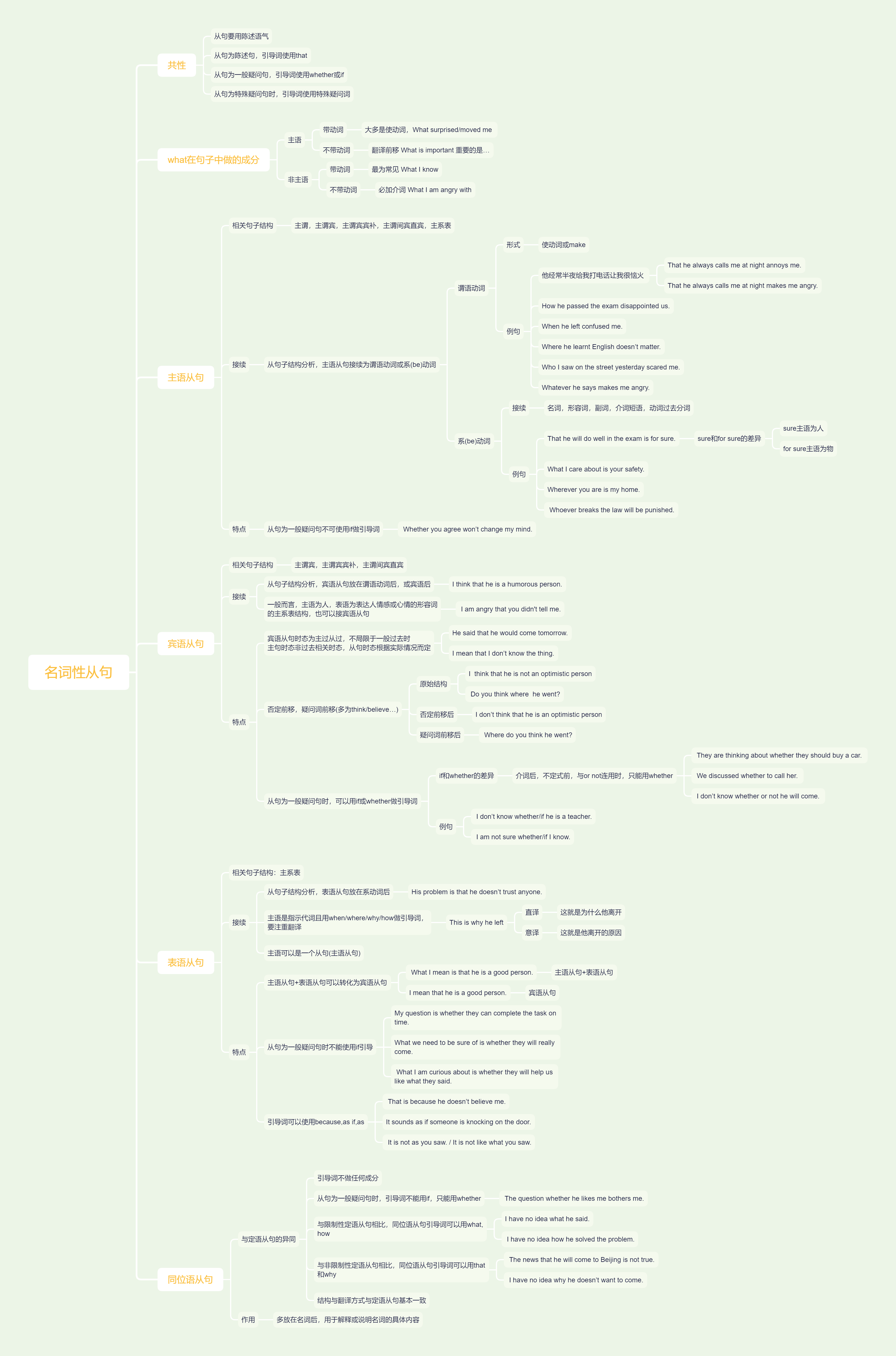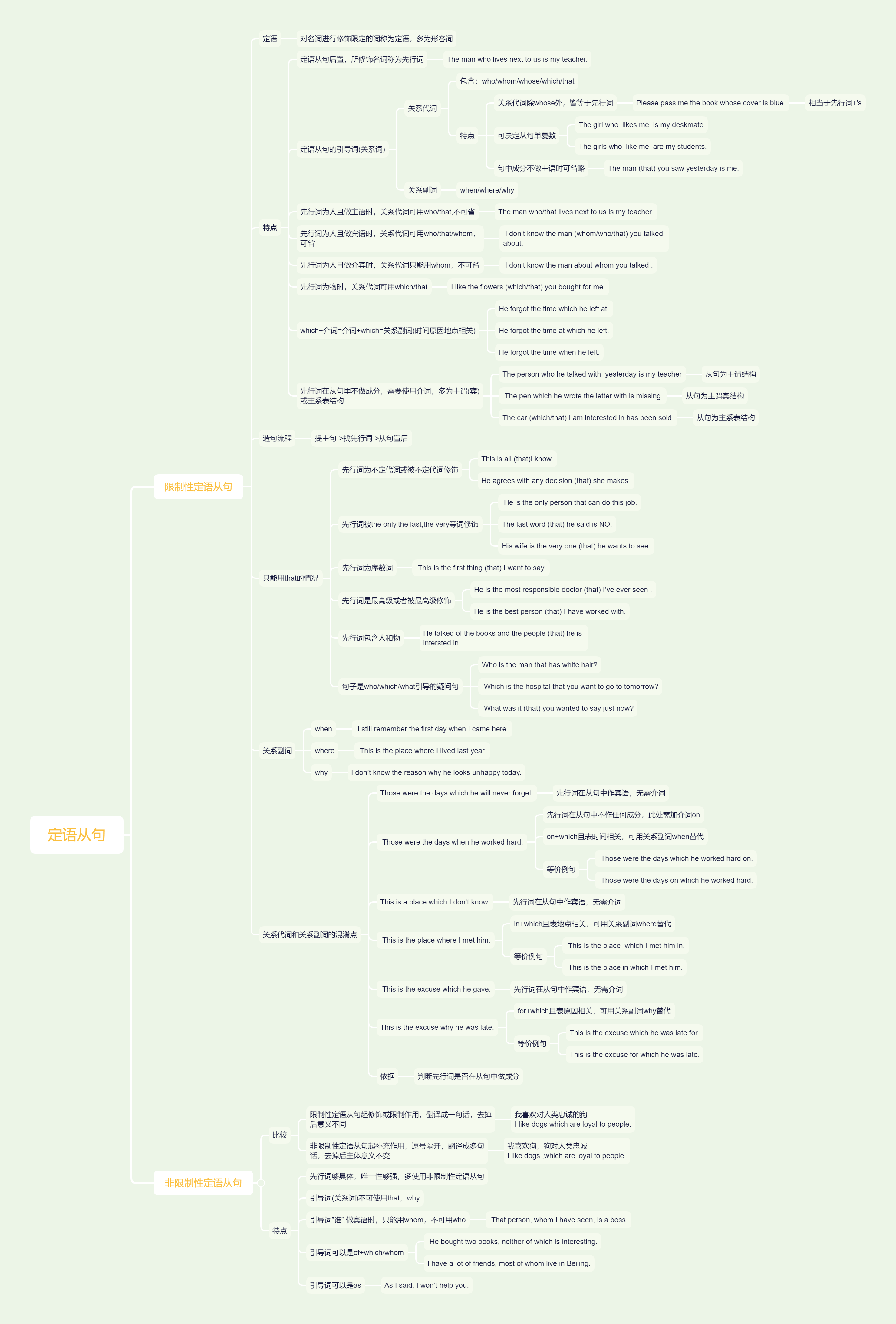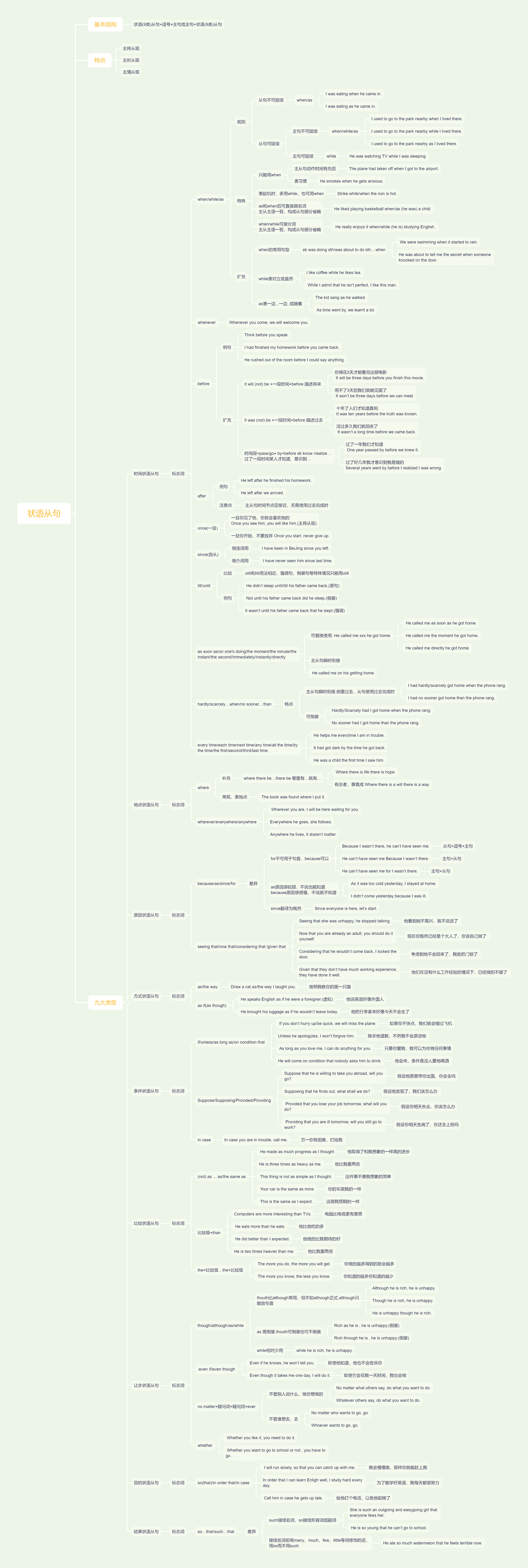名词性从句
名词性从句包括主语从句,宾语从句,表语从句 从句要用陈述语气 从句为陈述句,引导词使用that 从句为一般疑问句,引导词使用whether或if 从句为特殊疑问句时,引导词使用特殊疑问词
what在句子中做的成分
做主语且带动词 ,大多是使动词 ,What surprised/moved me 做主语且不带动词,翻译前移 What is important 重要的是... 不做主语且带动词,最为常见 What I know 不做主语且不带动词,必加介词 What I am angry with
主语从句
相关句子结构:主谓,主谓宾,主谓宾宾补,主谓间宾直宾,主系表 从句子结构分析,主语从句接续为谓语动词或系(be)动词 谓语动词用使动词或make 系(be)动词,接续名词,形容词,副词,介词短语和动词过去分词 一般疑问句不可使用if连接
从句为陈述句
他经常半夜给我打电话让我很恼火 That he always calls me at night annoys me/makes me angry . 他这次考试会考好这是肯定的 That he will do well in the exam is for sure.(sure主语为人for sure主语为物)
从句为一般疑问句
你同意不同意都不会改变我的想法 Whether you agree won’t change my mind. 他能不能过来很重要 Whether he can come is important.
从句为特殊疑问句
他通过考试的方式让我们失望 How he passed the exam disappointed us. 他什么时候离开的让我很迷惑 When he left confused me. 他在哪学的英语都无所谓 Where he learnt English doesn’t matter. 昨天我在街上看到的人吓到我了 Who I saw on the street yesterday scared me. 不管他说什么都让我生气 Whatever he says makes me angry. 我在乎的是你的安全 What I care about is your safety. 你在的任何地方就是我的家 Wherever you are is my home. 不管是谁违反了法律都会被惩罚 Whoever breaks the law will be punished.
宾语从句
相关句子结构:主谓宾,主谓宾宾补,主谓间宾直宾 从句子结构分析,宾语从句放在谓语动词后,或宾语后 一般而言,主语为人,表语为表达人情感或心情的形容词的主系表结构,也可以接宾语从句 宾语从句时态为主过从过(一般过去,过去完成时,过去进行时,过去完成进行时) 否定前移,疑问词前移(多为think/believe...) 从句为一般疑问句时,可以用if或whether连接,介词后,不定式前,与or not连用时,只能用whether
从句为陈述句
他说他明天会来 He said that he would come tomorrow. 我的意思是我不知道这件事 I mean that I don't know the thing. 我觉得他不是个乐观的人 I don't think that he is an optimistic person.(否定前移) 你觉得他会去哪了呢 Where do you think he went?(疑问词前移) 我很生气你没告诉我 I am angry that you didn't tell me.
从句为一般疑问句
我不知道他是不是老师 I don't know whether/if he is a teacher. 我不确定我知不知道 I am not sure whether/if I know. 我们讨论了要不要给她打电话 We discussed whether to call her. (只能用whether) 他们在考虑要不要买车 They are thinking about whether they should buy a car. (只能用whether) 我不知道他是不是回来 I don't know whether or not he will come. (只能用whether)
从句为特殊疑问句
我不知道我该干什么 I don't know what I should do. 我不确定他说什么了 I am not sure what he said. 你知道我什么时候买的这辆车吗 Do you know when I bought this car? 我不知道他去哪了 I don't know where he went. 我不确定他为什么不想来 I am not sure why he doesn't want to come. 你想知道他为什么迟到吗 Do you want to know why he was late? 我相信他说的话是真的 I believe it true what he said.
表语从句
相关句子结构:主系表 从句子结构分析,表语从句放在系动词后 主语是指示代词且用when/where/why/how做引导词,要注重翻译 主语也可以是主语从句,主语从句+表语从句可以转化为宾语从句 从句为一般疑问句时不能使用if引导 引导词可以使用because,as if,as
从句为陈述句
他的问题是他不相信任何人 His problem is that he doesn't trust anyone. 这就是他离开的原因 This is why he left . 我的意思是他是个好人 I mean that he is a good person.(宾语从句) 我的意思是他是个好人 What I mean is that he is a good person.(主语从句+表语从句)
从句为一般疑问句
我的问题是他们能不能按时完成任务 My question is whether they can complete the task on time. 我们需要确定的是他们是不是真的会来 What we need to be sure of is whether they will really come. 我好奇的是他们会不会向他们所说的帮我们 What I am curious about is whether they will help us like what they said.
从句为特殊疑问句
重点是他怎么把问题解决的 The point is how he solved the problem. 这个表是我昨天丢的 The watch is what I lost yesterday. 他就是那时娶的她 That is when he married her. 我想知道的是他们什么时候走的 What I want to know is when they left. 这就是为什么他不相信我 This is why he doesn't believe me. 我就是在那里看到的他 That is where I saw him. 这就是我昨天见到的那个人 This is who I met yesterday.
because/as if/as
并不是你看到的那样 It is not as you saw. / It is not like what you saw. 那是因为我生他的气 That is because I am mad at him. 听起来好像有人在敲门 It sounds as if someone is knocking on the door.
同位语从句
多放在名词后,用于解释或说明名词的具体内容 结构与翻译方式与定语从句基本一致 引导词不做任何成分 从句为一般疑问句时,引导词不能用if,只能用whether 与限制性定语从句相比,同位语从句引导词可以用what,how 与非限制性定语从句相比,同位语从句引导词可以用that和why
例句
他是个好老师的事实不可否认 The fact that he is a good teacher can't be denied. 他喜不喜欢我这个问题困扰我 The question whether he likes me bothers me. 我不知道他说了什么 I have no idea what he said. 我不知道他怎么把问题解决的 I have no idea how he solved the problem. 他会来北京的消息不是真的 The news that he will come to Beijing is not true. 我不知道他为什么不想来 I have no idea why he doesn't want to come.
定语从句
限制性定语从句
对名词进行修饰限定的词称为定语,多为形容词 定语从句特点 定语从句后置,所修饰名词称为先行词 定语从句的引导词(关系词)包含:关系代词(who/whom/whose/which/that)和关系副词(when/where/why) 关系代词除whose外,皆等于先行词,可决定从句单复数,句中成分不做主语时可省略 先行词为人且做主语时,关系代词可用who/that,不可省 先行词为人且做宾语时,关系代词可用who/that/whom,可省略 先行词为人且做介宾时,关系代词只能用whom,不可省略 先行词为物时,关系代词可用which/that which+介词=介词+which=关系副词(时间原因方式相关) 先行词在从句里不做成分,需要使用介词,多为主谓(宾)和主系表结构
造句流程:提主句->找先行词->从句置后
例句
住我们隔壁的那个人是我的老师 The man who/that lives next to us is my teacher. 我不认识你说的那个人 I don't know the man (whom/who/that) you talked about. I don't know the man about whom you talked .
你昨天从超市买的鸡蛋不新鲜 The eggs you bought from the supermarket are off. 我喜欢你给我买的花 I like the flowers (that/which) you bought for me. 请把那本蓝色封皮的书递给我 Please pass me the book whose cover is blue. 他忘了他离开的时间
He forgot the time when he left. He forgot the time at which he left . He forgot the time which he left at.
他写信用的那只笔不见了 The pen which he wrote the letter with is missing. 昨天和他谈话的那个人是我的老师 The person who he talked with yesterday is my teacher 我感兴趣的那辆车已经被卖了 The car (which/that) I am interested in has been sold.
只能用that的情况
先行词为不定代词或被不定代词修饰 先行词被the only,the last,the very等词修饰 先行词为序数词 先行词是最高级或者被最高级修饰 先行词包含人和物 句子是who/which/what引导的疑问句
这是我知道的全部 This is all (that)I know. 他同意她做的任何决定 He agrees with any decision (that) she makes. 他是唯一能做这个工作的人 He is the only person that can do this job. 他说的最后一个词是NO The last word (that) he said is NO. 他的妻子就(正好)是他想见的人 His wife is the very one (that) he wants to see. 这是我想说的第一件事 This is the first thing (that) I want to say. 他是我见过的最有责任感的医生 He is the most responsible doctor (that) I've ever seen . 他是和我一起工作过的最好的人 He is the best person (that) I have worked with. 他谈到了他感兴趣的人和书 He talked of the books and the people (that) he is intersted in. 那个白头发的人是谁 Who is the man that has white hair? 你明天想去哪家医院 Which is the hospital that you want to go to tomorrow? 你刚才想说的是什么 What was it (that) you wanted to say just now?
关系副词
我仍然记得我第一次来这里的那天 I still remember the first day when I came here. 这就是我上一年住的地方 This is the place where I lived last year. 我不知道他今天看起来不高兴的原因 I don't know the reason why he looks unhappy today.
关系代词和关系副词的混淆点
那是他永远不会忘记的日子 Those were the days which he will never forget. 那是他工作很努力的日子 Those were the days when he worked hard. 这是我不知道的地方 This is a place which I don't know. 这是我认识他的地方 This is the place where I met him. 这就是他给的理由 This is the excuse which he gave. 这就是他迟到的理由 This is the excuse why he was late.
非限制性定语从句
限制性定语从句起修饰或限制作用,翻译成一句话,去掉后意义不同 非限制性定语从句起补充作用,逗号隔开,翻译成多句话,去掉后主体意义不变 先行词足够具体,唯一性足够强,多使用非限制性定语从句 引导词(关系词)不可使用that,why 引导词"谁",做宾语时,只能用whom,不可用who 引导词可以是of+which/whom 引导词可以是as
例句
我喜欢对人类忠诚的狗 I like dogs which are loyal to people. 我喜欢狗,狗对人类忠诚 I like dogs ,which are loyal to people. 我认识Tom,他是我的朋友 I know Tom, who is my friend. 那个人是个老板,我见过那个人 That person, whom I have seen, is a boss. 这些树是我三年前种的,现在都死了 These trees, which I planted three years ago, are all dead now. 那套房子很好,主人是我的一个朋友 That house, whose owner is one of my friends, is very nice. 我周末可以陪你去,周末我有空 I will go with you on weekends, when I will be free. 他们去北京了,我在那里待过几年 They went to Beijing, where I stayed for several years. 他买了两本书,哪本都没意思 He bought two books, neither of which is interesting. 我有很多朋友,他们大部分都住在北京 I have a lot of friends, most of whom live in Beijing. 就像我说的那样,我是不会帮你的 As I said, I won't help you.
状语从句
状语九大类型:时间,地点,原因,方式,条件,比较,让步,结果,目的 特点:主将(将来时)从现,主祈(祈使句)从现,主情(情态动词)从现 基本结构:状语(9类)从句+逗号+主句或主句+状语(9类)从句
时间状语从句
标志词:when/while/as
从句不可延续,引导词使用when/as 从句可延续,主句不可延续,引导词使用when/while/as 从句可延续,主句可延续,引导词使用while 主从句动作时间有先后或表习惯时,只能用when 表趁机时,多用while,也可用when as和when后可直接跟名词,主从主语一致,构成从句部分省略 when/while可接分词,主从主语一致,构成从句部分省略 when的常用句型: sb was doing sth/was about to do sth....when while表对立或虽然 as表一边...一边..或随着
他进来时,我在吃饭 I was eating when/as he came in. 我以前住那儿的时候,我经常去附近的公园 I used to go to the park nearby when/while/as I lived there. 我睡觉时,他在看电视 He was watching TV while I was sleeping. 我到机场的时候,飞机已经起飞了 The plane had taken off when I got to the airport. 他焦虑时都会抽烟 He smokes when he gets anxious. 趁热打铁 Strike while/when the iron is hot. 他小时候喜欢打篮球 He liked playing basketball when/as (he was) a child 他学习英语时真的很享受 He really enjoys it when/while (he is) studying English . 我们正在游泳,就在这时开始下雨了 We were swimming when it started to rain. 他正要告诉我这个秘密,就在这时有人敲门 He was about to tell me the secret when someone knocked on the door. 我喜欢咖啡而他却喜欢茶 I like coffee while he likes tea. 虽然我承认他不完美,但我喜欢这个人 While I admit that he isn't perfect, I like this man. 这小孩边走边唱 The kid sang as he walked. 随着时间的流逝,我们都知道了很多 As time went by, we learnt a lot.
标志词:Whenever
不管你什么时候来,我们都欢迎 Whenever you come, we will welcome you.
标志词:before/after
it will (not) be +一段时间+before 描述将来 it was (not) be +一段时间+before 描述过去 时间段+pass/go + by+before sb know /realize... 过了一段时间某人才知道、意识到... after:主从句时间节点足够近,无需使用过去完成时
说话之前要动脑 Think before you speak. 你回来之前我已经做完作业了 I had finished my homework before you came back. 我还没来得及说他就冲出了房间 He rushed out of the room before I could say anything. 你得花3天才能看完这部电影 It will be three days before you finish this movie. 用不了3天后我们就能见面了 It won't be three days before we can meet. 十年了人们才知道真相 It was ten years before the truth was known. 没过多久我们就回来了 It wasn't a long time before we came back. 过了一年我们才知道 One year passed by before we knew it. 过了好几年我才意识到我是错的 Several years went by before I realized I was wrong. 他完成作业后就走了 He left after he finished his homework. 我们到了以后他离开的 He left after we arrived.
标志词:once/since
once:一旦 since:自从,可做连词用,也可做介词用
一旦你见了他,你就会喜欢他的 Once you see him, you will like him.(主将从现) 一旦你开始,不要放弃 Once you start, never give up. 自从你走后我一直呆在北京 I have been in BeiJing since you left.(做连词用) 自从上次之后,我再也没见过他 I have never seen him since last time.(做介词用)
标志词:utill/till
utill和till用法相近,强调句,倒装句等特殊情况只能用utill
他爸爸回来他才睡
He didn't sleep until/till his father came back. Not until his father came back did he sleep.(倒装) It wasn't until his father came back that he slept.(强调)
其他标志词
as soon as/on one's doing/immediately/instantly/directly/the moment/the minute/the instant/the second 主从句瞬时衔接,可替换使用 hardly/scarcely...when/no sooner...than 主从句瞬时衔接,可替换使用,侧重过去,从句使用过去完成时,可倒装 every time/each time/next time/any time/all the time/by the time/the first /second/third/last time
他一到家就给我打了电话
He called me as soon as/immediately/the instant he got home. He called me on his getting home.
我刚到家电话铃就响了
I had hardly/scarcely got home when the phone rang. Hardly/Scarcely had I got home when the phone rang.(倒装) I had no sooner got home than the phone rang. No sooner had I got home than the phone rang.(倒装)
每次我一有困难他就会来帮我 He helps me everytime I am in trouble. 他回来的时候,天已经黑了 It had got dark by the time he got back. 我第一次见他的时候,他还是个小孩 He was a child the first time I saw him.
地点状语从句
标志词:where/wherever/everywhere/anywhere
where there be...there be 哪里有...就有...
我的书在我原来放的地方找到了 The book was found where I put it. 有生命的地方就有希望 Where there is life there is hope. 有志者,事竟成 Where there is a will there is a way. 不管你在哪,我都会在这等你 Wherever you are, I will be here waiting for you. 不管他去哪,她都跟着 Everywhere he goes, she follows. 不管他住在哪里,都无所谓 Anywhere he lives, it doesn't matter.
原因状语从句
标志词:because/as/since/for
for不可用于句首,because可以 as原因感较弱,不说也能知道;because原因感很强,不说就不知道 since翻译为既然
他不可能看到我了,因为我当时并不在那里
Because I wasn't there, he can't have seen me. He can't have seen me Because I wasn't there. He can't have seen me for I wasn't there.
我昨天没来因为我病了 I didn't come yesterday because I was ill.
因为昨天天气太冷,我就呆在家了 As it was too cold yesterday, I stayed at home.
既然大家都到了,那我们就开始吧 Since everyone is here, let's start.
标志词:seeing that/now that/considering that /given that
他看到她不高兴,就不说话了 Seeing that she was unhappy, he stopped talking. 现在你既然已经是个大人了,你该自己做了 Now that you are already an adult, you should do it yourself. 考虑到他不会回来了,我就把门锁了 Considering that he wouldn't come back, I locked the door. 在他们没有什么工作经验的情况下,他们已经做的不错了 Given that they don't have much working experience, they have done it well.
方式状语从句
标志词:as/the way
按照我教你的画一只猫 Draw a cat as/the way I taught you.
标志词:as if(as though)
他说英语好像外国人 He speaks English as if he were a foreigner.(虚拟) 他把行李拿来好像今天不会走了 He brought his luggage as if he wouldn't leave today.
条件状语从句
标志词:if/unless/as long as/on condition that
如果你不快点,我们就会错过飞机 If you don't hurry up/be quick, we will miss the plane. 除非他道歉,不然我不会原谅他 Unless he apologizes, I won't forgive him. 只要你爱我,我可以为你做任何事情 As long as you love me, I can do anything for you. 他会来,条件是没人要他喝酒 He will come on condition that nobody asks him to drink.
标志词:Suppose/Supposing/Provided/Providing
假设他愿意带你出国,你会去吗 Suppose that he is willing to take you abroad, will you go? 假设他发现了,我们该怎么办 Supposing that he finds out, what shall we do? 假设你明天失业,你该怎么办 Provided that you lose your job tomorrow, what will you do? 假设你明天生病了,你还去上班吗 Providing that you are ill tomorrow, will you still go to work?
标志词:in case
万一你有困难,打给我 In case you are in trouble, call me.
比较状语从句
标志词:(not) as ... as/the same as
他取得了和我想象的一样高的进步 He made as much progress as I thought
他比我重两倍 He is three times as heavy as me.
这件事不像我想象的简单 This thing is not as simple as I thought. 标志词:比较级+than
你的车跟我的一样 Your car is the same as mine.
这跟我预期的一样 This is the same as I expect.
电脑比电视更有意思 Computers are more interesting than TVs.
他比他吃的多 He eats more than he eats.
他做的比我期待的好 He did better than I expected.
他比我重两倍 He is two times heavier than me.
标志词:the+比较级...the+比较级
你做的越多得到的就会越多 The more you do, the more you will get. 你知道的越多你知道的越少 The more you know, the less you know.
让步状语从句
标志词:though/although/as/while
thouth比although常用,但不如although正式 although只能放句首 as 需倒装,thouth可倒装也可不倒装 while相对少用
虽然他很富有,然而他并不快乐
Although he is rich, he is unhappy. Though he is rich, he is unhappy. He is unhappy though he is rich. Rich as he is , he is unhappy.(倒装) Rich through he is , he is unhappy.(倒装) while he is rich, he is unhappy.
标志词:even if/even though
即使他知道,他也不会告诉你 Even if he knows, he won't tell you. 即使它会花我一天时间,我也会做 Even though it takes me one day, I will do it.
标志词:no matter+疑问词=疑问词+ever
不管别人说什么,做你想做的
No matter what others say, do what you want to do. Whatever others say, do what you want to do.
不管谁想去,去
No matter who wants to go, go. Whoever wants to go, go.
标志词:whether
不管你喜不喜欢,你都得做 Whether you like it, you need to do it. 不管你想不想上学,你都得去 Whether you want to go to school or not , you have to go .
结果状语从句
标志词:so...that/such...that
such接续名词,so接续形容词或副词 接续名词前有many、much、few、little等词修饰的话,用so而不用such
他太小还不能上学 He is so young that he can't go to school. 他吃了那么多西瓜,结果现在感觉很不舒服 He ate so much watermelon that he feels terrible now. 这个女孩很外向也很随和,大家都喜欢她 She is such an outgoing and easygoing girl that everyone likes her.
目的状语从句
标志词:so(that)/in order that/in case
我会慢慢跑,那样你就能赶上我 I will run slowly, so that you can catch up with me. 为了能学好英语,我每天都很努力 In order that I can learn Enligh well, I study hard every day. 给他打个电话,以免他起晚了 Call him in case he gets up late.
思维导图





